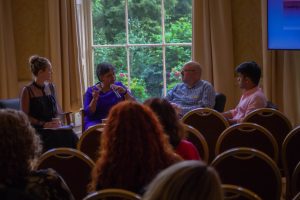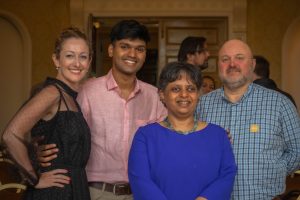Prof Kalpana Shankar
Creating an Irish Science, Technology, and Society (STS) Community: an Unconference
Prof Kalpana Shankar
Summary
On 25 June 2024, with the support of the EASST Network Fund and the University College Dublin Centre for Digital Policy, scholars from Ireland and elsewhere participated in a day-long hybrid (un)conference: Creating an Irish Science, Technology, and Society (STS) Community. This event, the first of its kind to take place in Ireland, brought together researchers from across the island and two keynote speakers, Professor Cassidy Sugimoto of the Georgia Institute of Technology (Georgia Tech, USA) and Professor Rob Kitchin of Maynooth University (Ireland) while also welcoming other scholars who are interested in the Irish STS context. The objective was to bring together researchers in Ireland who use critical and interpretive approaches to science, technology, and society for networking. In this post, we describe STS as a discipline and how STS scholarship intersects with digital policy.
What is Science, Technology, and Society (STS)?
STS is an interdisciplinary field that focuses on understanding how science and technology (broadly writ) shape institutions and societies – their values, practices, and processes. In turn, STS seeks to understand how those institutions and societies shape science and technology itself. STS interrogates the power that technologies such as the Internet, biomedicine, artificial intelligence, and others have but does not take for granted that how things are now is a fait accompli and that these technologies are the way they SHOULD be. Drawing on methods and theories from such disparate fields such as history of science and technology, philosophy, law, politics, the arts and humanities, communication and media, information studies, computing, engineering, and the biomedical sciences, STS researchers are interested in both the processes of science and technology but also their risks, benefits, impacts, and implications on other structures.
The need for an interdisciplinary approach – bringing together disciplines, sectors, and societies – is clear. Science and technology are some of the most powerful forces in modern societies and both visibly and invisibly are shaping and re-shaping our collective futures. However, it is clear that their benefits are uneven – and they pose risks that are often unequally borne by those with the least power to shape them. As the Harvard STS programme Web page puts it, “The rise of STS as a teaching field reflects a dawning recognition that specialization in today’s research universities does not fully prepare future citizens to respond knowledgeably and reflectively to the most important challenges of the contemporary world. Increasingly, the dilemmas that confront people, whether in government, industry, politics or daily life, cut across the conventional lines of academic training and thought”.
The intersections of STS with digital policy are also clear. Digital policy requires an interdisciplinary, cross-sectoral, multi-method approach. Balancing rights, risks, benefits, and responsibilities is challenging as digital technologies evolve and become “black boxed” at lightning speeds. As the UCD Centre for Digital Policy Website states on its About Us page: “Challenges in digital policy arise for numerous reasons, across all sectors, and evolve quickly. It is often the case that those with the knowledge and skills to develop new technologies are not aware of the broader implications of these new technologies. On the other hand, those tasked with developing, implementing, and evaluating governance and policy in the digital arena are not familiar with the ways in which technologies evolve or their potential effects and consequences. The universe of complex digital technologies is vast; there is no simple “one shot fix” that can govern all technologies.”
Ireland, STS, and the (Un)Conference
While Ireland has often looked to science and technology innovation to spur investment and growth (and continues to do so), there has been less space for critical evaluation and engagement – in other words, the very things that STS does well. Sociologists, geographers, media scholars, economists, and others who have examined the many intersections of science with other dimensions of society. Often such work is at odds with Irish research policy (and the funding that flows from it) which still promotes an approach that does not critique too closely the technologically deterministic, and neoliberal narrative of scientific and technological progress in Ireland.


The Unconference
The event was held on June 25 at the Museum of Literature of Ireland, a beautiful Georgian era building in the heart of Dublin. We had thirty attendees in person and eight online, with interest expressed by many others in being part of a network. We structured the event to have opening remarks by Kalpana, our two keynotes, a panel consisting of the keynote speakers and Kalpana, and self-organized breakout sections with a final wrap-up. The breakout sections were loosely organized around themes of interest that researchers indicated in their registration, including but not limited to STS collaboration with other disciplines, science communication, methods for STS, feminist and decolonial STS, building community, and creating an STS identity in Ireland.
The first keynote speaker, Professor Rob Kitchin, is a professor at Maynooth University’s Social Sciences Institute. His search interests encompass a wide range of topics, including software, big data, smart cities, Internet and cyberspace, cartographic theory, mapping and dashboards, data infrastructures and practices, as well as spatial theory and geographic methods. Professor Kitchin spoke about his own experiences in Ireland and elsewhere as an urban geographer and advisor to funding agencies and policymakers. The second speaker, Professor Cassidy Sugimoto, holds the position of Professor and is the Tom and Marie Patton School Chair in the School of Public Policy at Georgia Institute of Technology. Her research interests encompass Ethics and Philosophy of Science and Technology, History of Technology/Engineering and Society, S&E Organisations, Education, Careers and Workforce, and Science and Technology Studies. Her research covers themes related to gender, education policy, inequality, inequity, social justice, and policy analysis. Her talk focused on how and where STS diverges, historically and disciplinarily, from cognate disciplines (such as science studies and science policy) and what the implications of those divergences and convergences are for current topics like disinformation, artificial intelligence, and inequality in science and technology.
At the end of the day, the participants came back together to reflect on how such a network could be continued, where resources could be found, and expanding the scope and reach. The organizers will be launching a listserv in the autumn and discussing online paper presentations as next steps.
Conclusion
Ireland is an old country but a young nation. It has a highly educated workforce, technological ambitions, a geographical location that straddles Europe and North America, and remains an important locus for the implementation of regulation and policy around emerging digital technologies. As a result, it should be foregrounded as a place where important conversations and critiques of science and technology are happening.
The UCD Centre for Digital Policy asserts that policy making and evaluation “must be deliberative, emergent, and iterative, with sociocultural values at their core” (to quote the Centre’s Website again). STS, while not always focused on policy making, has also has stressed the need to foreground research, dialogue, and the sociotechnical context in which science and technology exist.
References
Boden, M., & Fitzgibbon, M. (1995). Evaluation of science and technology policy in Ireland. Research Evaluation, 5(1), 55-62.
Bonetta, L., 2008. Celtic Strength: Science in Ireland. Science, 322(5902), pp.773-778.
Cullina, E., Harold, J. and McHale, J., 2021. Irish science policy: a case study in evidence-based policy design for small open economies. In Policy Analysis in Ireland (pp. 235-248). Policy Press.
Mercille, J., Murphy, E., 2015. Ideological Power and the Response to the Crash. Deepening Neoliberalism, Austerity, and Crisis: Europe’s Treasure Ireland, pp.70-89.
Crawley, G.M. and O’Sullivan, E., 2006. The ‘Celtic Tiger’ and a knowledge economy. Industry and Higher Education, 20(4), pp.225-229.
——————————————————————————————–
Author:
Kalpana Shankar is a Professor of Information and Communication Studies at University College Dublin. Her research and teaching focus on the research ecosystem itself, open data, and data archives and sharing, as well as other work on research evaluation and peer review. She has been involved with the STS community since she was a PhD student at the University of California, Los Angeles.
Contact: Kalpana.shankar@ucd.ie